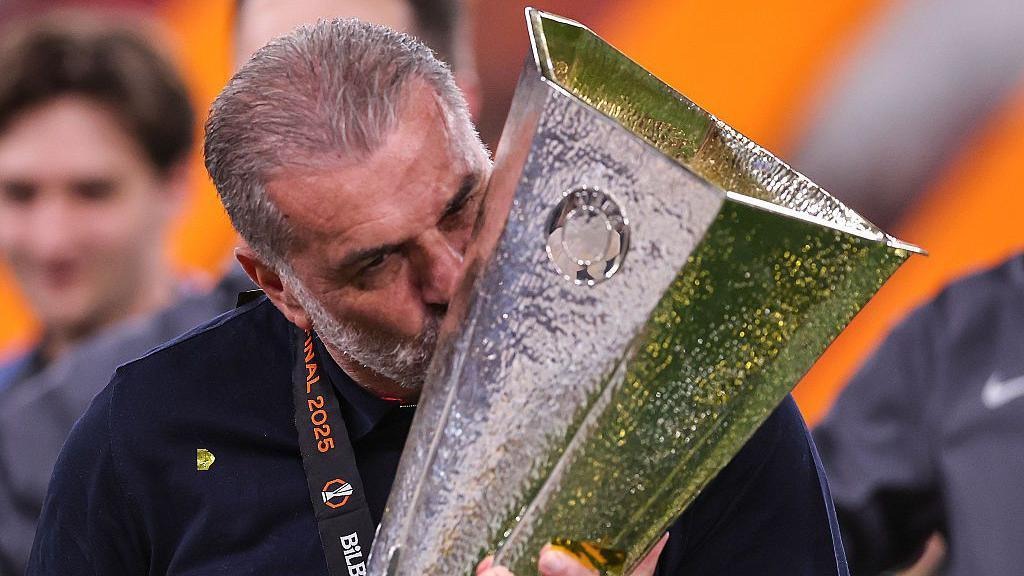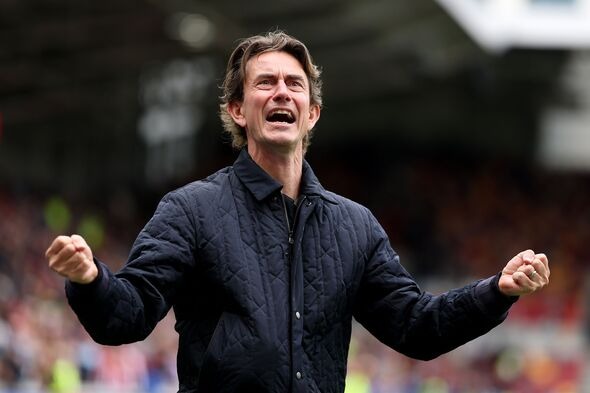Why sacking Postecoglou was the right call - and Frank is the perfect replacement

And so it comes to an end. Exactly two years to the day that Ange Postecoglou arrived in N17 with the prerogative of re-establishing attacking football at a club which had drastically lost its way under the pragmatism and volatility of two “serial winners”, the Australian was relieved of his duties shortly after breaking Tottenham Hotspur’s 17 year trophy drought.
It is a decision that had seemed inevitable since midway through a record-breakingly bad league campaign, yet after that now famous night in Bilbao, the mood among the fanbase had swung. But it was only the thoughts of one man that would ultimately count and Daniel Levy, after a period of deliberation, concluded the Europa League trophy did not forgive a 17th placed league finish.
The general school of thought is emotion should be taken out of decisions like these. The Erik Ten Hag comparison has been repeatedly cited as an example of this, in which Manchester United appeared to row back on their decision to sack the Dutchman after he unexpectedly triumphed over Manchester City to clinch the FA cup. They backed him in the summer transfer market, only to sack him anyway a few months later after a dismal start to the season. Postecoglou’s Europa League triumph provided fans with a moment of pure ecstasy, but it coincided with Spurs’ worst top flight finish since they were last relegated in 1977. They lost more games (22) than any side previously to not be relegated at a rate of 57.9%, the worst loss rate they have ever recorded. They conceded 65 goals in the league — outside of the relegated sides, only Wolves conceded more. This would have been grim enough reading if it was Postecoglou’s first season, but the fact it has happened in his second means the trajectory seemed clear. The oft cited statistic that after collecting 26 points from his first ten league games, Postecoglou won just 78 from his next 66, makes for grim reading. Some might argue it is illogical to discount his start, but doing show illustrates that after an initial bounce, Spurs were consistently poor under his stewardship.
Of course, there were extenuating circumstances. Tottenham endured a horrific injury crisis, leaving them without a full XI for large parts of the season. The defence was particularly hard-hit, with Vicario, Udogie, Romero and Van de Ven missing a combined 91 games. Any side would feel the effects of this. But, as has been pointed out, there was a feeling Postecoglou’s uncompromisable approach to his high intensity brand of football contributed to the high amount of muscular injuries. There were also reports of disagreements with the medical staff, leading to risking Romero and Van de Ven before they had fully recovered against Chelsea. Both pulled up injured again and missed a significant chunk of the season.
Postecoglou didn’t help himself at times. Why, for instance, did he neglect using squad players like Djed Spence more earlier in the season, before the injury crisis took hold? And why, when the starting XI had been ravaged by injury, did he refuse to compromise on his style, when the personnel available clearly could not carry out Angeball effectively enough? Postecoglou frequently clashed with reporters during the height of the injury crisis, bemoaning the lack of context afforded to their performances and claiming they would be far improved once everyone was back. Yet, as the players started to return, the losses kept on coming and instead the reasons provided shifted to Spurs’ focus on the Europa League.
This was fair to an extent. Postecoglou rightly identified winning a trophy as being the single most important thing for the club at this point and, as seen from the reactions, this provided fans with one of their greatest nights. But a club which has spent the amount that Tottenham has and who boast players like Richarlison, Yves Bissouma and (at times) James Maddison on the bench should be able to juggle the league and Europe better than they did. The cold hard facts are that after beating an equally dire Manchester United in mid-February, Spurs only recorded league wins against the relegated duo of Ipswich Town and Southampton.
A key factor in any decision to sack a manager must always be whether a replacement who offers a sufficient improvement can be brought in, otherwise what is the point of making the change? Currently, the overwhelming favourite is Brentford manager Thomas Frank, who after winning the Bees promotion to the Premier League for the first time has established the West London club in the top flight. At first glance, it might appear an underwhelming choice. Frank has never managed in a European competition or won a trophy. But, this is an unfair analysis. For how can a manager achieve such things if they are never offered an opportunity at a club who can genuinely compete for them? Brentford had the 2nd lowest wage bill in the league last season. It is a testament to Frank as a manager that at one point, European football appeared on the cards.

This is what always seemed unfair about criticism levelled at Mauricio Pochettino for having never won a trophy. Pochettino’s career, up until breaking his trophy duck at PSG, involved three years at Espanyol, one-and-a-half at Southampton and just over five at Spurs, who had won two trophies in 23 years at the time of his arrival. Unsurprisingly, it took the Argentine little time to clinch his first silverware once at the dominant force in French football, winning the French Super Cup just 11 days after his appointment.
In fact, the appointment of Frank would bear some similarities with that of Pochettino, albeit coming later in his career — Pochettino had completed three full seasons in club management when he arrived in N17, Frank has completed nine, along with five years managing Denmark’s youth sides. Similarly to Pochettino, Frank would be moving from a mid-table Premier League club on the basis of helping them punch above their weight. Like Pochettino, Frank is known for being a charismatic leader who emphasises togetherness and has pulled off victories against the big teams in English football.
Pochettino was perhaps more wedded to a specific footballing philosophy, formed while playing under the influential Marcelo Bielsa. “Pochball” became synonymous with high pressing and flying full backs — every game you watched a Pochettino team you knew you were going to witness front-foot attacking football and energetic pressing off-the-ball. Whereas Frank is seen as more tactically flexible. Brentford were promoted from the Championship as the division’s top scorers and often dominating possession. But, unlike recent examples such as Daniel Farke’s Norwich, Vincent Kompany’s Burnley and Russell Martin’s Southampton, Frank chose to adjust his style, favouring a more direct approach which often involved long punts from the keeper up to Ivan Toney. Brentford switched to a five-at-the-back system against sides they expected to dominate the ball and emphasised physicality over style.
But over time, as Brentford have established themselves in the division, Frank has evolved their system. This year, they often lined up in a 4–3–3, even against the league’s best, and finished as the joint-fifth highest scorers. This, despite losing Ivan Toney last January.
And Frank has become known for his tactical innovations, such as his focus on the kick-off to games, which led to the Bees becoming the first team to score in the opening minute of three consecutive games. They work hard on set-pieces, utilising long throw-ins, and often employ an effect man-to-man high press.
This adaptability might prove invaluable to a club like Spurs, wanting to compete for the Champions League places without matching the spending of other top teams. There is an argument Postecoglou’s uncompromising, no-holds-barred philosophy would prove more effective at creating sustained success, but it needs the best players. Look at Guardiola at Manchester City. It was only after bringing in players that suited his system that they began to hit the heights they have. Given Levy’s tendency to pursue second and third choice targets, Postecoglou likely would’ve been relying on those not quite at the level his system requires.
All in all, Frank might well be precisely the sort of manager Spurs need. He has the communicative skills to get fans and players alike on board after a sacking that has clearly upset both. He has the tactical flexibility to adjust to different opponents and different game states. He develops players (just look at Mbeumo, Wissa and Damsgaard) and has experience working with constrained resources. And he has now proved that he can produce a team that scores goals and plays attractive football at Premier League level, a factor that is vital at Tottenham Hotspur.
So, although it seems unfair to part with the man who brought glory back to N17. The man who dared to say he’d win and then did. It is perhaps the right decision in a league which is more competitive and volatile than ever before. The fact Tottenham finished 17th was not just down to their own dismal performances. Never before has the Premier League had the strength in depth it now does. The “big 6” has been fragmented and Spurs have been leapfrogged by Newcastle and Aston Villa. And, with the potential for another 60+ game season, there is a strong case Angeball was only ever going to lead to the same issues as this year. One dismal finish can be viewed as an anomaly, but if it were to happen immediately again, Spurs risk falling into a different bracket where their rivals are the likes of Brighton, Bournemouth and Nottingham Forest.
Once the dust settles, perhaps it will be viewed as an ideal ending. Rather than leaving on a dark cloud in a few months if last season’s league form resumed, instead Postecoglou departs on a high. No Spurs fan will ever forget that night in Bilbao. Postecoglou has cemented his legacy, achieving on that famous night what only two men had done before him. He said he would win a trophy in his second season and he did. Postecoglou departs a Spurs legend and can move on to pastures new in the knowledge that he brought joy and restored a sense of pride to an entire fanbase.
0 Comments Add a Comment?